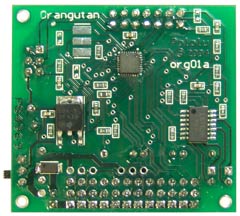Want to build a small robot that doesn’t look like a PCB on wheels? The Orangutan is small enough for integrating into a small robot, rather than being the small robot. With a powerful Atmel mega168 AVR microcontroller, motor drivers, buttons, display, and buzzer, all you need to add is your own chassis, sensors, software,… you know, the fun stuff!
Overview
 |
| Pololu Orangutan Robot Controller back view. |
The Orangutan robot controller is a complete control solution for small robots. It includes an 8-characterx2-line liquid crystal display, two bi-directional motor ports, a buzzer, three pushbuttons, and up to 12 user I/O lines, yet the compact module measures only 2.00"x1.85" and weighs less than 1ounce. Because of the complete feature set, very few additional components (such as sensors or motors) need to be added to complete the electronic portion of a small robot. The small package allows for greater flexibility in incorporating the electronics into the mechanical design of a robot.
The Orangutan is based on Atmel’s ATmega168 AVR microcontroller, which features 16Kbytes of flash program memory, 1024bytes of SRAM, and 512bytes of EEPROM. Up to 8channels of 10-bit analog-to-digital conversion are also available. Because the user has direct access to the microcontroller, any development software for Atmel’s AVR microcontrollers, including Atmel’s free AVR Studio and the WinAVR GCC C/C++ compiler, is compatible with the Orangutan. An in-circuit programmer, such as our USB AVR programmer, is required for programming the Orangutan.
The Orangutan input voltage is 5-10V, making it well-suited for use with small DC motors and 5- to 8-cell NiCd or NiMH battery packs. The motor driver can supply up to a maximum of 1A per motor channel, subject to power dissipation requirements. Total power consumption (with motors and buzzer off) is under 15mA.
Specifications & On-Board Hardware
- overall unit dimensions: 2.00"x1.85"
- input voltage: 5-10V
- 2 bidirectional motor ports connected to LB1836M motor driver (1A maximum per channel)
- programmable 8MHz Atmel ATmega168 AVR microcontroller (16kB flash, 1kB SRAM, 512bytes EEPROM)
- 12 user I/O lines, 10 of which can be used for digital I/O and 8 of which can be used as analog input channels
- 8-characterx2-line LCD
- buzzer
- 3 user pushbutton switches
- 1 user LED
- user potentiometer tied to ADC7
Dimensions
General specifications
| Processor: |
ATmega168 @ 8 MHz |
| RAM size: |
1024 bytes |
| Motor driver: |
LB1836M |
| Motor channels: |
2 |
| User I/O lines: |
121 |
| Max current on a single I/O: |
40 mA |
| Minimum operating voltage: |
5 V |
| Maximum operating voltage: |
10 V |
| Continuous output current per channel: |
0.5 A |
| Peak output current per channel: |
1 A |
| Reverse voltage protection?: |
Y |
| External programmer required?: |
Y |
| LCD included?: |
Y |
Notes:
- 1
- 10 can be used as digital I/Os and 8 can be used as analog inputs.
Recommended links
- WinAVR
- A free, open-source suite of development tools for the AVR family of microcontrollers, including the GNU GCC compiler for C/C++.
- AVR Studio 4
- The older version of Atmel’s free integrated development environment (IDE) for AVRs, which is no longer supported by Atmel.
- ATmega168 documentation
- Atmel’s product page for the ATmega168.
- Pololu 3pi Forum Section
- The 3pi discussion section of the Pololu Robotics Forum.
- AVR Freaks
- AVR community with forums, projects, and AVR news.
- Orangutan-lib
- An open-source C library for the Orangutan family of robot controllers. Note: this library was not created by and is not maintained by Pololu; it contains only limited support for the Orangutan X2 and does not directly support the Orangutan SV-168, Orangutan LV-168, or Baby Orangutan B revision.
- Tutorial: AVR Programming on the Mac
- Customer Michael Shimniok has written a guide to programming AVRs (the Orangutan LV-168, specifically) using the Mac.
No recommended products at the moment.
No recommended products at the moment.